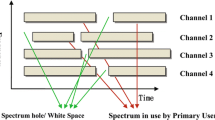Abstract
In order to solve the uncertainty resulting from shadowing effect and resist the attack from malicious cognitive radio (CR) users, we propose a fault-tolerant cooperative spectrum sensing scheme for CR networks, where an energy detection-based local spectrum sensing is performed at each CR user, a coefficient is used to weight each CR user’s sensing result, a linear weighted fusion process is performed at the fusion center (FC) to combine received sensing results. For a fault-tolerant cooperative spectrum sensing scheme, the most important issue is to distinguish whether the CR user is reliable or not. In this paper, a reputation-based cooperative mechanism is presented to alleviate the influence of the unreliable sensing results from CR users suffering shadowing and the false sensing data from malicious CR users on the detection result at the FC. In proposed fault-tolerant cooperative scheme, each cooperative CR user has a reputation degree which is initialized and adjusted by the FC and used to weight the sensing result from the corresponding user in the fusion process at the FC. And then, two reputation degree adjusting methods are presented to manage the reputation degree of each CR user. Simulation results show that the proposed scheme can not only weaken the harmful influence caused by malicious CR users, but also alleviate the corrupted detection problem resulting from destructive channel condition between the primary transmitter and the CR user. Moreover, the detection performance of the fault-tolerant cooperative scheme, which has a feasible computational complexity and needs no instantaneous SNRs, is close to that of the optimal scheme.
Similar content being viewed by others
References
Akyildiz I. F., Lee W., Vuran M. C., Mohanty S. (2008) A survey on spectrum management in cognitive radio networks. IEEE Communications Magazine 46(4): 40–48
Yucek T., Arslan H. (2009) A survey of spectrum sensing algorithms for cognitive radio applications. IEEE Communications Surveys & Tutorials 11(1): 116–130
Budiarjo I., Lakshmanan M., Nikookar H. (2008) Cognitive radio dynamic access techniques. Wireless Personal Communications 45(3): 293–324
Ganesan G., Li Y. (2007) Cooperative spectrum sensing in cognitive radio, Part II: Multiuser networks. IEEE Transactions on Wireless Communication 6(6): 2214–2222
Ma, J., & Li, Y. (2007). Soft combination and detection for cooperative spectrum sensing in cognitive radio networks. In Global telecommunications conference (GLOBECOM), pp. 3139–3143.
Sun, C., Zhang, W., & Letaief, K. B. (2007). Cooperative spectrum sensing for cognitive radios under bandwidth constraints. In Wireless communications and networking conference (WCNC), pp. 1–5.
Shin O. S., Shin Y. (2011) Cooperative spectrum sensing based on adaptive weighting for a cognitive radio system. IEICE Electronics Express 8(5): 279–284
Chen H., Jin X., Xie L. (2009) Reputation-based linear cooperation for spectrum sensing in cognitive radio networks. Journal of Zhejiang University-Science A 10(12): 1688–1695
Huang, X., Han, N., Zheng, G., Sohn, S., & Kim, J. (2007). Weighted-collaborative spectrum sensing in cognitive radio, In Communications and networking in China (CHINACOM), pp. 110–114.
Quan Z., Cui S., Sayed A. H., Poor H. V. (2009) Optimal multiband joint detection for spectrum sensing in cognitive radio networks. IEEE Transactions on Signal Processing 57(3): 1128–1140
Roosta, T. Y., Mishra, S. M., & Ghazizadeh, A. (2006). Robust estimation and detection in Ad Hoc and sensor networks. In IEEE International conference on mobile adhoc and sensor systems (MASS), pp. 236–245.
Kaligineedi, P., Khabbazian, M., & Bhargava, V. K. (2008). Secure cooperative sensing techniques for cognitive radio systems. In IEEE international conference on communications (ICC), pp. 3406–3410.
Chen, R., Park, J. M., & Bian, K. (2008). Robust distributed spectrum sensing in cognitive radio networks. In Conference on computer communications (INFOCOM), pp. 1876–1884.
Zhao, T., & Zhao, Y. (2009). A new cooperative detection technique with malicious user suppression. In IEEE international conference on communications (ICC), pp. 1–5.
Wang B., Liu K. J. R., Clancy T. C. (2010) Evolutionary cooperative spectrum sensing game: How to collaborate?. IEEE Transactions on Communications 58(3): 890–900
Mucchi L., Ronga L. S., Del Re E. (2011) Physical layer cryptography and cognitive networks. Wireless Personal Communications 58(1): 95–109
Zeng Z., Paweczak P., Cabric D. (2010) Reputation-based cooperative spectrum sensing with trusted nodes assistance. IEEE Communications Letters 14(3): 226–228
Garg, A., Battiti, R., & Cascella, R. (2005). Reputation management: Experiments on the robustness of ROCQ. In Autonomous decentralized systems (ISADS), pp. 725–730.
Zhang, W., Mallik, R. K., & Letaief, K. B. (2008). Cooperative spectrum sensing optimization in cognitive radio networks. In IEEE international conference on Communications (ICC), pp. 3411–3415.
Kay, S. M. (1998). Fundamentals of statistical signal processing: Detection theory (vol. 2). Englewood Cliffs: Prentice Hall.
Quan Z., Cui S., Sayed A. H. (2008) Optimal linear cooperation for spectrum sensing in cognitive radio networks. IEEE Journal of Selected Topics in Signal Processing 2(1): 28–40
Author information
Authors and Affiliations
Corresponding author
Rights and permissions
About this article
Cite this article
Chen, H., Zhou, M., Xie, L. et al. Fault-Tolerant Cooperative Spectrum Sensing Scheme for Cognitive Radio Networks. Wireless Pers Commun 71, 2379–2397 (2013). https://doi.org/10.1007/s11277-012-0943-5
Published:
Issue Date:
DOI: https://doi.org/10.1007/s11277-012-0943-5




